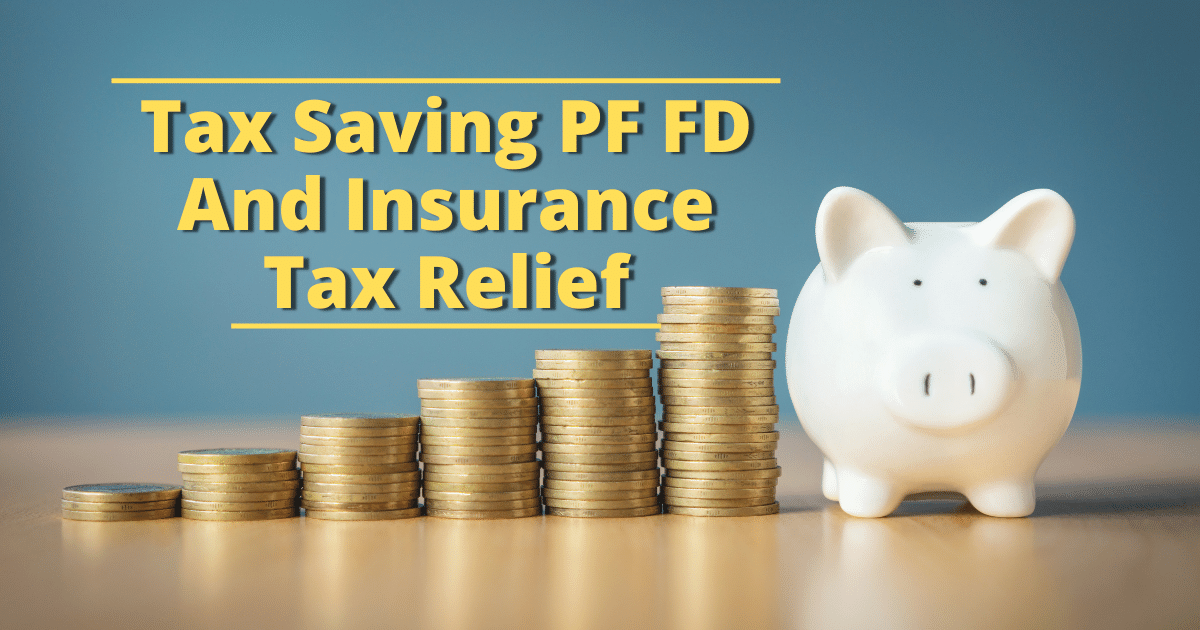Introduction:
Rajkotupdates.news : tax saving pf fd and insurance tax relief, When it comes to financial planning, one of the key aspects is minimizing tax liabilities while optimizing wealth creation. To achieve this, individuals can leverage various tax-saving instruments and strategies. In this article, we will explore the potential tax benefits of three popular options: Provident Fund (PF), Fixed Deposits (FD), and Insurance Tax Relief.
- Provident Fund (PF): Provident Fund is a retirement savings scheme offered by the government or certain employers. It helps employees build a substantial corpus over time while enjoying tax benefits. Here’s how it works:

a. Tax Exemption on Contributions:
Rajkotupdates.news : tax saving pf fd and insurance tax relief Both the employee and the employer contribute a certain percentage of the employee’s salary to the PF account. The employee’s contribution up to 12% of their basic salary is tax-deductible under Section 80C of the Income Tax Act, 1961.
b. Tax-Free Interest:
The interest earned on PF contributions is tax-free, making it an attractive long-term investment option.
c. Tax-Free Withdrawals:
At the time of retirement or after a continuous period of unemployment for two months, the PF amount can be withdrawn tax-free.
- Fixed Deposits (FD): Fixed Deposits are popular investment avenues for individuals looking for fixed returns and capital preservation. Apart from providing financial security, FDs also offer tax benefits:
a. Tax Deduction on 5-Year Tax Saving FD: Investments made in specific 5-year tax-saving fixed deposits offered by banks are eligible for a deduction of up to Rs. 1.5 lakh under Section 80C.

b. Interest Income Taxation: The interest earned on FDs is taxable as per the individual’s income tax slab. However, individuals can benefit from income tax exemptions if they fall under the tax slab with lower rates or utilize the basic exemption limit.
- Insurance Tax Relief: Life and health insurance policies not only provide financial security but also offer tax advantages. Let’s delve into the tax benefits associated with insurance policies:
a. Life Insurance Premium Deduction: Premiums paid towards life insurance policies for self, spouse, and children are eligible for deduction under Section 80C, subject to a maximum of Rs. 1.5 lakh.

b. Health Insurance Premium Deduction: Premiums paid for health insurance policies for self, spouse, children, and parents are eligible for a deduction of up to Rs. 25,000 under Section 80D. In the case of senior citizens, the limit is increased to Rs. 50,000.
Must Read=Rajkotupdates.news : famous singer lata mangeshkar has died
c. Additional Deduction for Preventive Health Check-ups: An individual can claim an additional deduction of up to Rs. 5,000 under Section 80D for expenses incurred on preventive health check-ups for self, family members, or parents, subject to certain conditions.
Conclusion:
Rajkotupdates.news : tax saving pf fd and insurance tax relief, Tax-saving instruments such as Provident Fund (PF), Fixed Deposits (FD), and Insurance Tax Relief play a crucial role in minimizing tax liabilities while enabling individuals to secure their financial future. By leveraging the tax benefits associated with these investment options, individuals can optimize their tax savings and build a robust financial portfolio. However, it is essential to consult with a tax professional or financial advisor to determine the most suitable strategy based on individual circumstances and goals.
FAQS
Q1: What is a Provident Fund (PF)?
A1: Provident Fund (PF) is a retirement savings scheme offered by the government or certain employers. It involves both the employee and employer contributing a percentage of the employee’s salary to a PF account, which grows over time and can be withdrawn at retirement or after a continuous period of unemployment.
Q2: How does PF help in tax savings?
A2: PF offers tax benefits in multiple ways. The employee’s contribution to the PF account up to 12% of their basic salary is tax-deductible under Section 80C of the Income Tax Act. Additionally, the interest earned on PF contributions is tax-free, and withdrawals from the PF account are also tax-free.
Q3: What are Fixed Deposits (FDs)?
A3: Fixed Deposits are investment instruments offered by banks, where individuals deposit a lump sum amount for a fixed period at a predetermined interest rate. FDs provide a fixed return on investment.
Q4: How can FDs help in tax savings?
A4: FDs offer tax benefits through tax-saving fixed deposits. Investments made in specific 5-year tax-saving FDs are eligible for a deduction of up to Rs. 1.5 lakh under Section 80C of the Income Tax Act. However, the interest earned on FDs is taxable as per the individual’s income tax slab.
Q5: What is Insurance Tax Relief?
A5: Insurance Tax Relief refers to the tax benefits associated with life and health insurance policies. Premiums paid towards life insurance policies and health insurance policies can provide deductions under different sections of the Income Tax Act.





